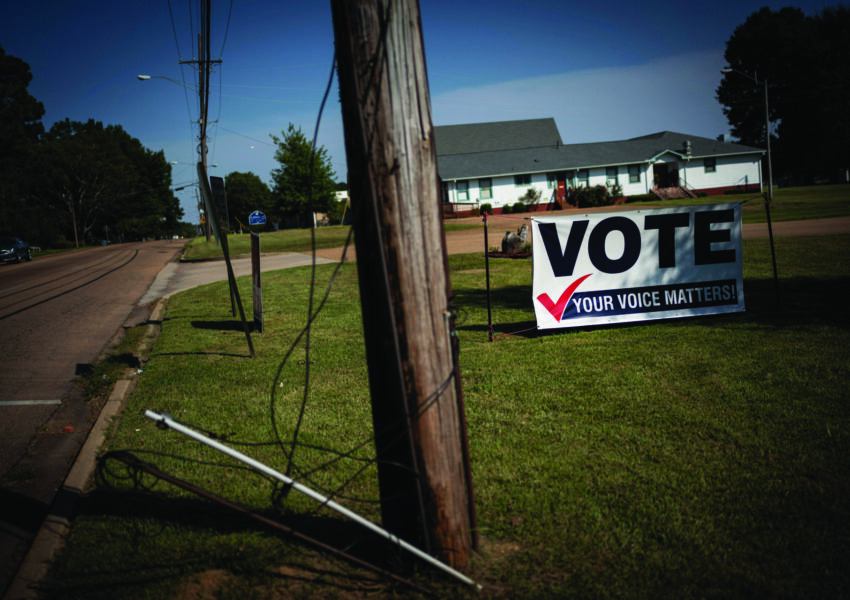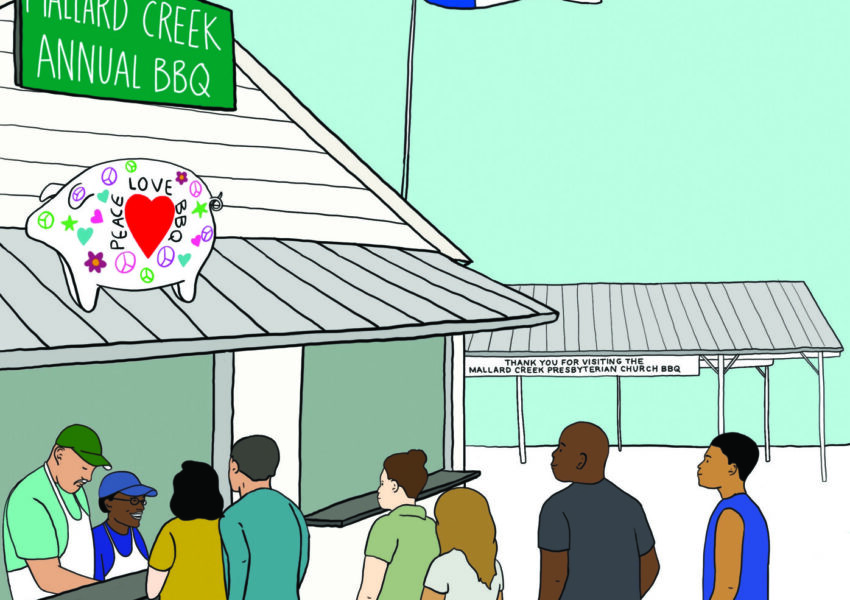How To Criminalize Kindness (And Alienate Voters) Georgia’s Election Integrity Act of 2021 takes aim at hospitality in the polling place.
by Ariel Felton
Illustration by Lindsey Bailey
![]()
When the 2020 presidential election turned Georgia into a battleground state, I braced for the worst.
There’s a lot at stake when the nation turns its eyes south. Media outlets tend to reduce the expansive culture of the South to the same old stereotypes. Some focus on the political scandals that cast the region as a place with rampant structural inequity. Others publish deep dives on communities populated by a monolith of white, conservative voters. As a Black liberal woman in Georgia, it’s rare to find stories of voters like myself in mainstream national media outlets.
In the fall of 2020, when Joe Biden won a state whose electoral votes had gone to Republican candidates since 1996 and President Donald Trump pressured state election officials to overturn the results, it felt for a moment as though Georgia was all anyone wanted to talk about. There was some of the usual snark. SNL’s “Blue Georgia” skit—which featured actors speaking in mock Southern accents about the state turning blue, eating gluten-free avocado toast, and announcing their pronouns as “she/ma’am”—made me chuckle. But in the aftermath of the election, I saw another narrative begin to shine through: the story of Southern hospitality and collective effort. I read about churches bussing people to the polls on Sundays, Black women in Georgia leading epic statewide voter registration campaigns, and perhaps the most Southern tradition of all: people finding common ground through food.
All over the state, organizations and volunteers showed up to polling stations to feed voters stuck in long lines. Chefs, restaurants, food trucks, and caterers in Atlanta partnered with World Central Kitchen to offer free tacos and sandwiches to people in line, many of whom had been waiting to vote for more than six hours. In Savannah, 9to5, a national organization that advocates for economic security for women and families, organized volunteers to distribute bottled water to voters waiting in the heat. And in Dougherty County in southwestern Georgia, volunteers with the nonprofit organization Black Voters Matter handed out both snacks and sample ballots. Across counties, their goal was the same: encouraging people to stay in line.
Watching these dispatches made me smile. Here were people going out of their way to lessen the burden of a problem they didn’t create and couldn’t immediately solve. Finally, the South I knew and loved was getting national attention.

The feeling was short-lived. Just four months later, Georgia Republicans passed the Election Integrity Act of 2021 (SB 202), a sweeping list of provisions that restrict voter access across the state. The law shortens the timeline voters have to request mail-in ballots and introduces new voter identification requirements, among other provisions. To me, the most ridiculous piece of the legislation prohibits the practice of “line warming,” which it defines as providing food or beverages to voters within 150 feet of the polling location and within twenty-five feet of any voter in line. Secretary of State Brad Raffensperger claimed the action was taken to stop organizations from inappropriately influencing voters in the crucial moments before they cast their ballots. The more likely effect, however, will be lots of hungry and irritable voters in densely populated areas, tempted to abandon long lines before voting at all.
After the 2020 election, I read about churches bussing people to the polls on Sundays, Black women in Georgia leading epic statewide voter registration campaigns, and perhaps the most Southern tradition of all: people finding common ground through food.
Food isn’t just how Southerners turn strangers into neighbors; it’s how we fuel movements and social change. Consider Georgia Gilmore’s buttermilk biscuits, which she fed to civil rights leaders after losing her job for participating in the 1955 Montgomery Bus Boycott. When Black people gathered outside of a midtown Atlanta Waffle House in 1961, ready to test the limits of the previously all-white space, cofounder Joe Rogers Sr. invited them all inside for a meal without incident. In 2020, Maria Acosta, who owns several McDonald’s restaurants in Texas, fed protesters marching after the killing of George Floyd.
In all of these instances, feeding someone was more than just a kind act. It signified solidarity in the face of extreme difficulties. It told people, “You’re welcome here. Please stay.”
Amanda Hollowell started line warming in 2018, during Georgia’s gubernatorial race between Democrat Stacey Abrams and Republican Brian Kemp. At the time, Hollowell was working as the Savannah organizer for 9to5.
It was a year of high early-voter turnout. According to election officials, nearly 6,061 votes were cast during the first five days of early voting in Chatham County, which includes Savannah. Hollowell and several other 9to5 volunteers scouted the polling places known to experience the longest lines, such as Jenkins High School, the Voter Registration office on Eisenhower Drive, and the Jonesville Baptist Church in Tatumville. All of these neighborhoods have high population density, and Tatumville is a majority-Black neighborhood.
“In the mornings, [wait times] varied, about forty-five minutes to an hour,” Hollowell said, explaining that the lines often moved faster early in the day. But after business hours, an hour wait was the minimum. “Our aim was to keep people in line.”
Similar to housewarming, the idea of line warming is to make voters feel cared for and welcomed, regardless of who they’re voting for. The group handed out slices of pizza and bottles of water to voters as well as poll workers, who are not allowed to leave the polling location until all votes are counted at the end of the day (except in the case of an emergency). In addition to food, the volunteers also organized carpool rides to polling stations. They even helped watch and entertain children standing in line with parents.
“Legally, we can’t discriminate against who the voter is,” Hollowell explained. “If somebody asks for water, we give them water. And people were extremely appreciative, because they realized, oh, someone’s actually thinking about me in this moment.”
Stacey Abrams lost the 2018 gubernatorial race by fewer than 60,000 votes. That close margin likely spurred the even higher turnout among Black Georgia voters in the 2020 presidential election.
Although she was no longer working officially for 9to5, Hollowell continued to volunteer as a line warmer. Due to Covid, their efforts around the 2020 election were scaled back a little, she said. They still handed out prepackaged foods like bags of chips, but mostly focused on water. “Even though it’s November, in Georgia it can still be so hot…God forbid someone passes out.”
SB 202 criminalizes the hospitality shown by Hollowell and any other person who provides refreshments to voters. Now, it’s a misdemeanor to give this sort of kindness. In March 2021, civil and voting rights groups including the Southern Poverty Law Center, American Civil Liberties Union, ACLU of Georgia, and the Legal Defense and Educational Fund Inc. filed a lawsuit asking for an immediate injunction of this and other provisions of SB 202. In August 2022, a judge denied the motion.
In the meantime, Hollowell expects volunteers will become more creative while line warming at the polls, which will also require voters to give each other grace.
“Maybe folks will rope off the length from the election door to 150 feet and use food trucks,” she said. “Or, if the polling location is next to a restaurant, how can volunteers encourage the restaurant to say, ‘Hey, if [voters] need anything, they can walk across the street and get anything, it doesn’t matter who you are.’” At that point, she said, it becomes a moment of trust among voters asking each other to hold their places in line.
As Georgia’s next general election creeps closer, I recall casting my own early ballot in Savannah in October 2018. It felt wrong to be awake that early on a Saturday morning, but duty and dread propelled me to my feet. The last time I waited until election day to vote, I’d stood in line for more than two hours. This time, I hoped to get it over with quickly.
At that point in Chatham County, there was only one early voting location open: the Voter Registration Office on Eisenhower Drive. I arrived fifteen minutes after the office opened, thinking I was making decent time, only to find myself stuck in a line of cars trying to enter the parking lot. It was chaos. By the time I parked and exited my car, the line of people was already starting to snake around the side of the building.
Those of us in line were eerily quiet as we inched forward. It’s rare that a group of Southerners gathers without speaking to one another, but I understood. I’d spent the last several months volunteering with Planned Parenthood, phone banking and knocking on doors around Savannah, and reminding people when and where to vote. I’d had enough phones and doors slammed in my face to last a lifetime. The tension of election season felt heightened by Trump’s divisive and chaotic first twenty-one months in office. If politicians weren’t fighting in the news, friends and family were arguing on Facebook. Every conversation about politics felt like a test with only one question: us, or them? It felt like everyone in line, myself included, had shown up begrudgingly, just ready to get it over with.
Forty minutes passed in silence, other than a few grumbled asides about the long wait and the quickly rising temperature. Cars continued to arrive, and I could no longer see the end of the line of voters. After an hour, the people closest to me seemed restless and ready to leave. As we took a few more steps forward and rounded the corner of the brick building, I noticed a young woman in a plain gray tank top pulling a wheeled cooler parallel to the line of voters. Every few feet, she’d stop, open the cooler, and offer someone a bottle of water. I watched as her hospitality not only stopped handfuls of people from leaving the line, but also made them crack the first smiles I’d seen all morning.
I felt myself relax and give in to the burden of the heat and the ache of my feet. I accepted a bottle of water from the young woman and thanked her. Okay, I thought, I’ll stay.
Ariel Felton is a Georgia-based writer whose work has appeared in The New York Times, The New Yorker, The Washington Post, The Bitter Southerner, and more. Her essay “A Letter to My Niece,” first published in The Progressive, was listed as notable in The Best American Essays 2020.
SIGN UP FOR THE DIGEST TO RECEIVE GRAVY IN YOUR INBOX.




